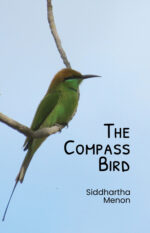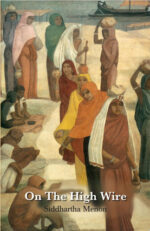-
The Compass Bird
$15About the Book
Observant and meditative, lit with gentle whimsy, Siddhartha Menon’s work on the animal world leads us from ornithology to ontology, detail to dazzling insight, in a wingbeat. Here is a book in which the reverie of snails, the ‘mynahness’ of mynahs, the unhurried gaze of nilgai, becomes a way to reflect on all the eternal questions—time, belonging, love, purpose, a world ‘stained with stillness’, in which ‘those who attend have the last word’. One of the most delightful new books of poetry I have read this year.
– Arundhathi Subramaniam
-
On The High Wire
$16About The Book
“How timely the invisible rain appears to be / when we have stopped expecting it,” says Siddhartha Menon: words that might equally apply to this substantial and somewhat unexpected collection that establishes him as a major Indian poet. The vocabulary is often unfussy and, despite the book’s title, the form carries no hijinks, but every line, you feel, has been tested, every line holds in the solitary practice of the mind. Here place is not a romance of names but an ethics of speaking and a scrupulous attention to both the immediate and the far away, the ants on a teaspoon or the spacecraft on the edge of Saturn, the sentry who “could be” a poet or the unfortunate politics of the state that holds us and others captive, an anonymous bellboy or the great actor Irrfan Khan who could make himself anonymous. Some of the most dazzling poems in the book are sequences; always, we can be sure that following Menon’s thought through will reward us and leave room for us. It’s like a magic trick with no sleight of hand. The “certitudes” may be “green and gleaming” but the “eyes betray the sting of wisdom”.
– Vivek Narayanan
-
The Owl and the Laughing Buddha
$12About the Book
The poems in The Owl and the Laughing Buddha bring a ‘lighthouse sweep of attentiveness’ to their subjects. This is a book about noting, from the title poem’s companionable but contrasting figures on a writing desk to the devastating aftermath of a cloudburst in the mountains, and from a flier’s eye-view to a walker’s – and a mole’s. Here are poems interested in gods and figures of myth, and in observing houses, trees, birds and other creatures in a changing neighbourhood; poems that talk shop with fellow poets and respond to works of art and culture; and poems that watch our responses to the daily catastrophes that sometimes constitute ‘news’ – whose interest is no less a matter of whimsy, perhaps, than some of the tales narrated in the final section of the book. Yet the poems rest on an implicit conviction that everything must be given its due and treated seriously – though not solemnly, for it is mirth, after all, that is the laughing Buddha’s centre of gravity. Treading margins between the real and the imagined, the concerned and the tongue-in-cheek, this is Menon’s third collection of poems.




